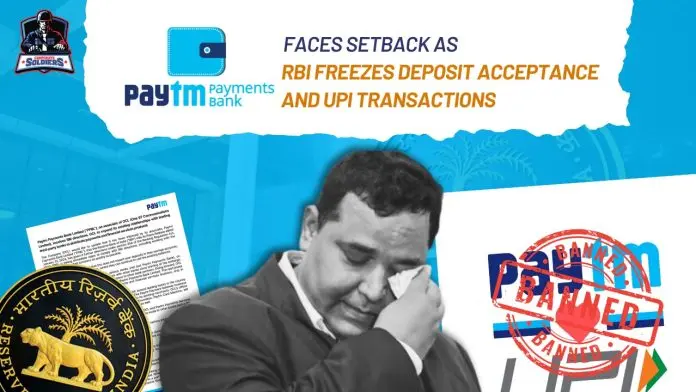Due to ongoing non-compliances and persistent supervisory concerns with Paytm Payments Bank, the Reserve Bank of India (RBI) has instructed the bank to cease accepting deposits into customers’ accounts effective February 29.
The RBI has instructed the bank to cease receiving deposits into prepaid instruments, wallets, and FASTags from February 29. However, it permits the bank to continue crediting interests, cashbacks, and refunds. Customers are still allowed to withdraw and utilize their balances with the bank.
After February 29, Paytm’s bank is barred from offering Unified Payment Interface (UPI) facilities, as stated by the RBI. Additionally, the nodal accounts of One97 Communications Limited, the parent company of Paytm, and Paytm Payments Services must be terminated promptly, no later than February 29.
In March 2022, the RBI issued directives to Paytm’s bank, instructing the cessation of new customer onboarding and the engagement of an IT audit firm for a comprehensive system audit. Recently, the central bank revealed that audit reports uncovered persistent non-compliances and significant supervisory concerns, prompting further regulatory action.
While specific details of the non-compliance issues remain undisclosed, the RBI invoked its authority under section 35A of the 1949 Banking Regulation Act in both instances. This section empowers the RBI to issue necessary directions to banking companies in specific situations.
Notably, brokerage firm Bernstein asserted that, with the recent RBI notifications, the operations of Paytm Payments Bank have effectively come to an end. Industry executives, cited by TechCrunch, highlighted the challenge Paytm faces in relocating various businesses to other banks without the crucial nodal accounts. The evolving situation raises questions about the future landscape of Paytm’s financial operations.
Exposing Ongoing Non-Compliance Issues
In response to a detailed system audit report and subsequent compliance validation by external auditors, the Reserve Bank of India (RBI) has taken decisive action against Paytm. The findings revealed “persistent non-compliances and continued material supervisory concerns,” leading the central bank to issue a circular announcing further supervisory measures.
Defiance and Consequences: RBI’s March Directive Ignored
Despite the RBI’s earlier directive on March 11, 2022, instructing Paytm Payments Bank (PPBL) to halt new customer onboarding immediately, the bank was discovered to be continuing this process through an offline mode, blatantly violating the regulatory directive. This breach necessitated additional regulatory steps to address the non-compliance issues.
Customer Empowerment Amid Regulatory Intervention
In light of the recent RBI directive, customers of Paytm Payments Bank retain the ability to withdraw or utilize the balances in their accounts without any constraints. This applies to various accounts, including savings bank accounts, current accounts, prepaid instruments, FASTags, and National Common Mobility Cards. The RBI’s focus on customer empowerment is evident amidst the regulatory actions taken against Paytm.
Ceasing Banking Functions and Nodal Account Closure
The Reserve Bank of India (RBI) has outlined stringent measures for Paytm Payments Bank (PPBL), effective February 29, 2024. The RBI directive specifies that after this date, the bank will no longer offer a range of banking services, including fund transfers (such as AEPS, IMPS), BBPOU, and UPI facilities.
Furthermore, the nodal accounts associated with One97 Communications Ltd and Paytm Payments Services Ltd are mandated to be closed by February 29. PPBL is instructed to conclude all pipeline transactions and nodal accounts by March 15, pertaining to transactions initiated on or before February 29, with no provision for further transactions thereafter.
As part of the RBI’s directive, Paytm app users linked to PPBL can continue to withdraw or transfer funds without restrictions. However, the directive highlights a significant change, disallowing any credits or top-ups into Paytm Payments Bank accounts or wallets from March 1, 2024.
Clarifying the Impact on Paytm App and Wallet Users
The directive also outlines the implications for both remitters and beneficiaries associated with Paytm Payments Bank. Until February 29, beneficiaries can receive credits through the Paytm app and wallet linked to PPBL accounts. Post this date, they can only withdraw or transfer funds, with no option for additional credits or top-ups from March 1 onwards.
Importantly, the RBI’s directive emphasizes that the prohibition on further credits or top-ups into Paytm Payments Bank accounts or wallets becomes effective from March 1, 2024, and does not take immediate effect. It aims to ensure a phased transition in alignment with the specified timelines.

